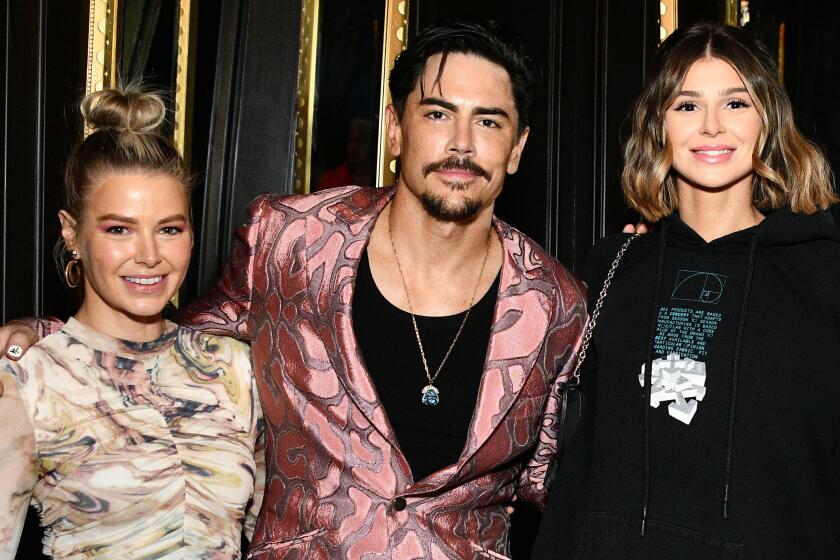Merging movies and activism
IT was probably the detailed discussion about the energy uses of cow manure that really threw me.
Normally when I sit in on meetings at production companies, the talk is all about outrageous actor salary demands, insane shooting schedules and botched script development. But at Participant Productions, the self-absorption of the movie business feels as far away as a distant moon of Jupiter. With the release of the company’s politically charged thriller “Syriana” looming later this month, Participant President Ricky Strauss and Internet outreach director Micki Krimmel were discussing upcoming social action initiatives linked to their new participate.net website. Instead of the typical talk about fast food or soft drink deals, the conversation revolved around carbon offsets, windmill facilities and a utility agency that converts methane from dairy waste -- that’s where the cows come in -- to usable energy.
“There’s even a [company] that’s converting Seattle-area buses to a bio-diesel fuel made from soy,” explains Krimmel. “They say it smells like popcorn.”
Launched early last year by EBay co-founder Jeff Skoll, Participant is a once-in-a-blue-moon business proposition, a media company devoted to making socially relevant movies. With something like $3.5 billion in his bank account, Skoll, 40, is eager to spend some of the money using the power of cinematic storytelling to stimulate involvement in social issues. “To me, we’re straddling the line between business and philanthropy,” says Skoll, whose earnest, thoughtful manner marks him as a fish out of water in the Hollywood shark tank. “If a film is successful, but does no good in the world, I would consider it a failure. Whereas if a movie does some good but doesn’t make a lot of money, I’d still say it was worthwhile.”
On his maiden voyage in movieland, the Canadian-born Skoll has had his ups and downs. His first release, “Good Night, and Good Luck,” the George Clooney-directed drama about Edward R. Murrow’s battle against Sen. Joe McCarthy, earned rave reviews and has kept its box-office momentum as it goes into wider release. But “North Country,” which stars Charlize Theron as a sexual harassment crusader, has been a bust, grossing only $17.5 million after a month in theaters.
Opening here on Nov. 23, “Syriana” is the company’s most ambitious project, a complex dissection by writer-director Stephen Gaghan of the perils of America’s addiction to Middle East oil. The $50-million film, which has an ensemble cast that includes Clooney and Matt Damon, is co-financed by Participant and Warner Bros., which also shared the costs on “North Country.” (“Good Luck” was co-financed with Mark Cuban’s 2929 Productions.)
“For me, the power of ‘Syriana’ is how, like ‘Traffic’ [written by Gaghan], it has interlocking stories that go from the global to the individual,” says Skoll. “It shows how our thirst for oil as consumers is tied into a much more complex set of events.”
“Syriana” is precisely the kind of movie studios no longer want to make, certainly not with their own money. That’s one reason why Hollywood has laid out the welcome mat for a new generation of wealthy investors and entrepreneurs. With costs skyrocketing and studios focused on making Big Event movies, outside investors are the perfect candidates to finance riskier fare, in particular mid-budget dramas and filmmaker-driven prestige movies.
Of the five films up for best picture at the Oscars last February, “Million Dollar Baby” was co-financed by Lakeshore Entertainment’s Tom Rosenberg, “Ray” was bankrolled by Phil Anschutz and “The Aviator” was largely financed by Graham King. Real estate entrepreneur Bob Yari helped finance “Crash” and “Thumbsucker” this year. Jim Stern, part owner of the Chicago Bulls, backed “Hotel Rwanda” and “Proof.” Bill Pohlad, whose family owns the Minnesota Twins, co-financed Ang Lee’s “Brokeback Mountain,” which is considered a top Oscar contender this year.
The days of fleecing wide-eyed outsiders may be over. Most studios do a better job of protecting their wealthy investors, realizing they need their continued largesse to fill out a release schedule. Having been badly embarrassed by its experience with Elie Samaha, who made a string of box-office stinkers, including “Feardotcom” and “Battlefield Earth,” Warners has stepped up in class, making “Syriana” with Skoll, splitting the costs of “The Polar Express” with billionaire activist Steve Bing and “Batman Begins” with financier Thomas Tull.
The talent agencies, led by CAA, are also nurturing these outsiders. It didn’t take CAA long to figure out that top actors and filmmakers on its huge roster were growing restive being offered forgettable lowbrow fare from studio development lists. Having worked hard to reach the top of the heap, how many movie stars want to spend the rest of their life in Eastern Europe, running around in front of a green screen pretending to be chased by computer-generated monsters?
Skoll’s focus on socially relevant films has made him a popular figure in a town where everyone has a passion project looking for a backer. When I ask what stars he’s met with, he jokes, “Who haven’t we seen?” Meg Ryan was in his office the other day. He’s also met with the likes of Michael Douglas, Salma Hayek, Jon Voight and Robert Redford. It would be easy to stereotype Skoll as yet another Hollywood lefty do-gooder. After all, his next project is a film based on “Fast Food Nation,” directed by Richard Linklater. But Skoll begs to differ, saying he is a “centrist” who would be open to making films that speak to conservative filmgoers. As a Canadian, he hasn’t participated in American elections, but if he did, he says he would’ve voted for Ronald Reagan and George H.W. Bush as well as Bill Clinton.
What really sets Participant apart from the competition isn’t just its movies but how they serve as a launching pad for grass-roots activism. At EBay, Skoll discovered that the company wasn’t just a virtual swap meet but a grass-roots organization. “It was a vehicle that allowed people to become empowered and communicate with each other,” he says. “It was hard to tell where the company left off and the community began.”
His new website operates in a similar fashion, allowing people who were moved by a film to do something about it in real life. He says part of the inspiration for his company came from “Schindler’s List,” which not only dramatized an important issue but led to the creation of the Shoah Foundation.
The company’s website has a specific social action campaign built around each Participant film. “North Country” is linked to Stand Up, a campaign geared at ending sexual harassment and domestic violence. The “Syriana” site, which will launch next week, will be linked to Oil Change, a campaign to reduce America’s dependence on oil. Skoll’s partner, Chris Adams, who has the title of chief vision officer, puts together corporate promotions and business development projects that complement Participant’s social action campaigns.
The relationships echo each film’s message. For “Syriana,” the company has a partnership with Terra Pass, which invests money in renewable energy programs. Participant also drives traffic to the website through incentive programs -- one upcoming contest, tied to the message of “Syriana,” involves the giveaway of a Segway stand-up scooter, a zero-emission vehicle that runs on lithium ion batteries.
The concept involves what Strauss calls passive activism. “People want to do good and make a difference,” he says. “So this is a way, like helping with Katrina relief or wearing a Lance Armstrong bracelet, where people can do something without totally giving up their lives in the process.”
Skoll isn’t such a starry-eyed dreamer that he’s willing to fund these projects forever on his own. His goal is to achieve enough success to attract outside investors. In the midst of developing a film based on “Reading Lolita in Tehran,” Skoll is hoping to team up with Omar Amanat, an online trading entrepreneur who wants to invest in films that would portray Muslims in a positive light.
“I’d never ask people to put up their money until we’ve shown we can do it ourselves,” says Skoll. “But I think there are other double bottom-line investors out there who care about getting their money back but want to achieve social gains too.”
Will Skoll succeed? I’d be lying if I said the odds were good. Financing films is a dicey game under any circumstances, but especially when you’re focusing on the exact kind of movies -- message-oriented dramas -- that are the hardest ones to sell. But using movies to promote social activism might be an idea whose time has come, especially when you see what someone like U2’s Bono has accomplished using his pop credibility as a launching pad for efforts to combat AIDS and famine in Africa.
It turns out Skoll has a particularly personal inspiration for his efforts. When he was 15, his father arrived home one day and announced to the family that he was seriously ill with cancer. But what bothered his father the most wasn’t dying, but that he hadn’t done the things he wanted to do with his life. “That had a huge impact on me,” explains Skoll, who says his father survived that health crisis. “I realized time is fleeting. I didn’t want to wait till it was too late to do something with my life.”
“The Big Picture” runs on Tuesdays in Calendar. Suggestions or criticism
can be e-mailed to patrick.goldstein@latimes.com.
More to Read
The biggest entertainment stories
Get our big stories about Hollywood, film, television, music, arts, culture and more right in your inbox as soon as they publish.
You may occasionally receive promotional content from the Los Angeles Times.






